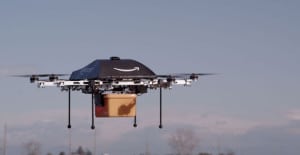 Less than 18 months after Jeff Bezos’ audacious announcement on “60 Minutes” of his plans for Amazon Prime Air, the company has moved one step closer to the use of drones in furthering its ever-expanding same-day delivery services.
Less than 18 months after Jeff Bezos’ audacious announcement on “60 Minutes” of his plans for Amazon Prime Air, the company has moved one step closer to the use of drones in furthering its ever-expanding same-day delivery services.
The Federal Aviation Administration has given Amazon Logistics conditional approval to test its drone delivery system by granting an experimental airworthiness certificate for research and development and crew training, according to the FAA’s website.
Under the provisions of the certificate, test flights of Amazon drones are limited to 400 feet in altitude or below, during daylight hours in clear conditions. The drones must also remain within visual line-of-sight of the pilot and an observer. Additionally, the FAA said the pilot must have at least a private pilot’s certificate and current medical certification.
For its part, Amazon has to provide monthly data from its testing to the FAA, including the number of flights conducted, pilot duty time per flight, unusual hardware or software malfunctions, any deviations from air traffic controllers’ instructions, and any unintended loss of communication links. These reporting steps are required by the FAA on all experimental airworthiness certificates for UAS (unmanned aircraft systems).
In related news, the U.S. Senate Subcommittee on Aviation Operations, Safety, and Security, will hold a hearing today on UAS, covering safety, innovation, economic impact and privacy. It will examine potential beneficial and the FAA’s efforts to safely integrate UAS into public airspace. Amazon’s VP of Public Policy, Paul Misener, will testify at the hearing, as well as representatives from the Brookings Institution, the National Farm Bureau Federation and the U.S. Government Accounting Office, among others.
Last year, the FAA began issuing exemptions to its commercial drone ban, for uses including movie and TV production, aerial photography, surveying and agricultural uses. In November, Amazon posted job ads for drone test pilots.
It remains to be seen if Amazon will be able to move beyond the much-hyped experimental phase – with its line-of-sight restriction – to full-blown commercial use. Many have raised concerns about the use of drones for deliveries, including how they’ll be able to safely navigate residential areas with so many physical obstructions.
